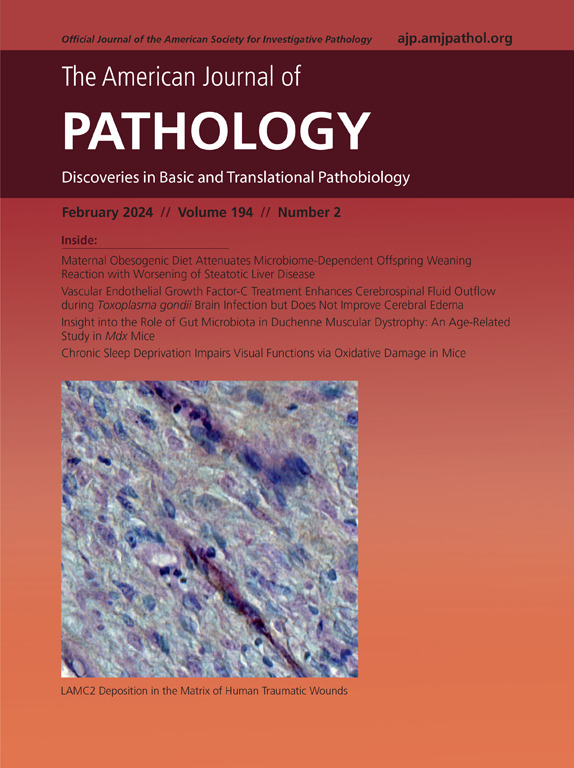Notch Signaling Aggravates Helicobacter pylori–Induced Inflammation by Promoting Macrophage Activation and Proinflammatory Th1/Th17 Responses
IF 3.6
2区 医学
Q1 PATHOLOGY
引用次数: 0
Abstract
The role of Notch signaling in regulating the immune response in infectious diseases has been extensively reported. However, its specific involvement in Helicobacter pylori infection is yet to be fully understood. In this study, in vitro analysis utilizing real-time quantitative PCR and Western blot revealed that H. pylori triggerred the activation of Notch signaling in murine bone marrow–derived macrophages (BMDMs) and co-cultured CD4+ T cells, a process mediated by jagged-1 (Jag1). There was a reciprocal enhancement between Jag1-Notch signaling and NF-κB pathway in H. pylori–infected macrophages. Pretreatment with a Notch signaling inhibitor, DAPT, reduced the expression of inflammatory mediators in macrophages, modulated their phenotype, and inhibited Th1 differentiation. In vivo, after DAPT treatment in H. pylori–infected mice, the differentiation of Th1 and Th17 was decreased as indicated by flow cytometry. Hematoxylin and eosin staining revealed reduced gastric mucosa inflammation, and enzyme-linked immunosorbent assay results demonstrated decreased levels of serum inflammatory cytokines. The terminal deoxynucleotidyl transferase deoxyuridine triphosphate nick end labeling (TUNEL) results showed that DAPT treatment improved the apoptosis of gastric mucosal cells. Collectively, the findings indicate that Notch signaling is implicated in exacerbating H. pylori–induced inflammation by promoting macrophage activation and Th1/Th17 responses, highlighting its potential for alleviating the progression of H. pylori–related diseases.
Notch信号通过促进巨噬细胞激活和促炎Th1/Th17反应加重幽门螺杆菌诱导的炎症
Notch信号在感染性和炎症性疾病中调节免疫反应的作用已被广泛报道。然而,它在幽门螺杆菌感染中的具体作用尚不完全清楚。在本研究中,利用实时定量PCR和Western blot的体外分析发现,幽门螺杆菌可触发小鼠骨髓源性巨噬细胞(bmdm)和共培养CD4+ T细胞中Notch信号的激活,这一过程由Notch配体蛋白jagge -1 (Jag1)介导。在幽门螺杆菌感染的巨噬细胞中,Jag1-Notch信号通路和NF-κB通路相互增强。Notch信号抑制剂DAPT预处理可降低巨噬细胞中炎症介质的表达,调节其表型,抑制Th1分化。在体内,经DAPT处理幽门螺杆菌感染小鼠后,流式细胞术分析Th1和Th17的分化减弱。苏木精和伊红染色显示胃粘膜炎症减轻,酶联免疫吸附试验结果显示血清炎症细胞因子水平降低。此外,末端脱氧核苷酸转移酶脱氧尿苷三磷酸缺口末端标记(TUNEL)结果显示,DAPT处理改善了胃粘膜细胞的凋亡。总之,这些发现表明Notch信号通过促进巨噬细胞激活和Th1/Th17反应参与了幽门螺杆菌诱导炎症的恶化,突出了其作为缓解幽门螺杆菌相关疾病进展的治疗靶点的潜力。
本文章由计算机程序翻译,如有差异,请以英文原文为准。
求助全文
约1分钟内获得全文
求助全文
来源期刊
CiteScore
11.40
自引率
0.00%
发文量
178
审稿时长
30 days
期刊介绍:
The American Journal of Pathology, official journal of the American Society for Investigative Pathology, published by Elsevier, Inc., seeks high-quality original research reports, reviews, and commentaries related to the molecular and cellular basis of disease. The editors will consider basic, translational, and clinical investigations that directly address mechanisms of pathogenesis or provide a foundation for future mechanistic inquiries. Examples of such foundational investigations include data mining, identification of biomarkers, molecular pathology, and discovery research. Foundational studies that incorporate deep learning and artificial intelligence are also welcome. High priority is given to studies of human disease and relevant experimental models using molecular, cellular, and organismal approaches.

 求助内容:
求助内容: 应助结果提醒方式:
应助结果提醒方式:


